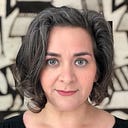Member-only story
Orthodox Judaism and the Pandemic: How Religion Affects Response
What makes Orthodox communities special may give them an extra layer of risk — or an extra layer of protection
It’s Shabbos in the Toco Hills neighborhood of Atlanta — the Jewish Sabbath — and it seems the entire community is out on foot. Sidewalks are clogged with people: A small boy in shorts and a kippah toddles behind a woman in a coral-hued knee-length dress, whining for her to carry his lunch box. A young man in a dark suit, white shirt, and wide-brimmed hat shuffles hurriedly with a book tucked under his arm. A millennial with the ritual knotted strings of tzitzit hanging from beneath a blue plaid shirt marshals four children across a quiet street.
In the parking lot outside the Beth Jacob synagogue, a rabbi gives a sermon on the week’s Torah reading — the story of Isaac and Esau — to a loose gathering of men in prayer shawls sitting on folding chairs in the dappled sunlight. Inside, the women’s section of the morning service is orderly, masked, and spaced well apart, the usual crowded tangle of running children and shushing mothers on indefinite hold.

